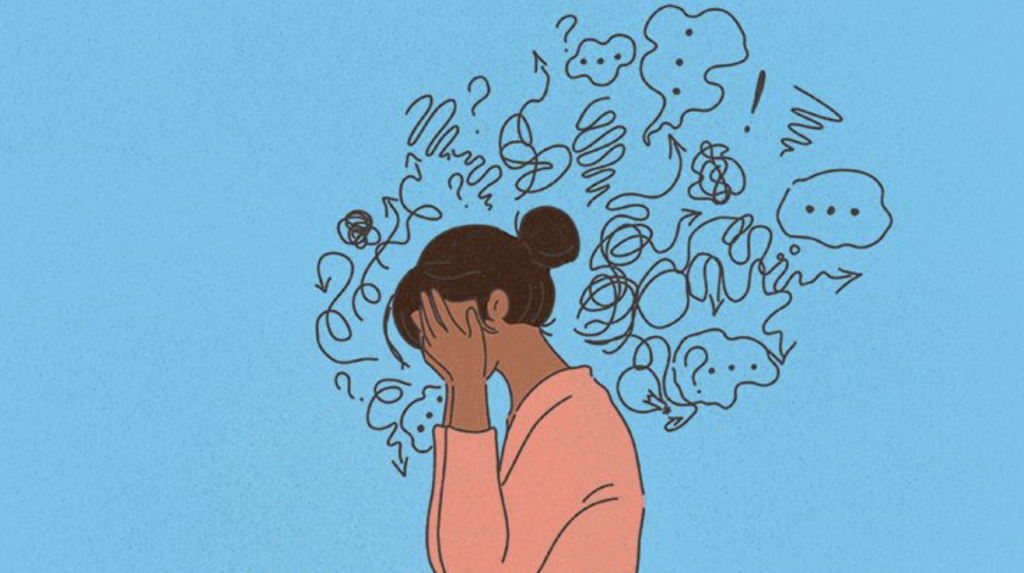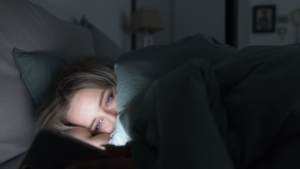
Is worry keeping you awake? If you’re experiencing stress in your life, chances are that you might be struggling to fall or stay asleep at night. Your anxious worry about life and its problems may keep your brain from settling down, and the disruption of sleep is likely to keep you feeling more on edge the next day.
Over 40 million Americans say they experience a long-term sleep disorder, with many others experiencing occasional sleep disruption. 70% of adults report that they experience daily stressors, so it makes sense that Americans on average are reporting they get less sleep than in previous decades.
All of this tossing and turning is taking a toll on our health and happiness. According to sleep specialist and director of the Center for Human Sleep Science at the University of California, Berkeley, Dr. Matthew Walker, two-thirds of adults fail to get the recommended 8 hours of sleep a night. Over half of Americans are trying to survive on less than six hours of sleep per night, which causes them to meet the medical definition of sleep deprivation.
Yes, we live in stressful times. There’s unexpected stresses to deal with, not to mention the normal, everyday anxiety caused by concerns like how to pay the mortgage and take care of the kids. Those anxiety "triggers" aren't going to go away.
But there ARE things we can do to reduce anxiety and get the sleep we need.
What Is Anxiety, and What Are Its Symptoms?
Anxiety is a general term for multiple disorders that can cause worry, nervousness, fear, and apprehension. Anxiety is defined as: "an emotion characterized by feelings of tension, worried thoughts, and physical changes like increased blood pressure."
Common symptoms of anxiety
Anxiety can manifest in many different ways, and present differently from person to person. Almost all types of anxiety involve a magnified sense of worry about something, but other symptoms may include:
Anxiety is an emotion that actually wakes us up, which is the exact opposite state of what you need to be in when you're trying to fall asleep.
Anxiety has many effects. When you first experience stress that triggers anxiety, for example, you may notice tension in your muscles. That's because the muscles actually "seize up" as a reflex reaction to the stress. The body also responds to anxiety by dispersing additional fluids to different parts of the body, which can cause the throat to become dry, and the throat muscles to tighten.
Stress also causes an increase in the chemical cortisol, which in turn causes the liver to produce more glucose. This causes a spike in your blood sugar levels that, if not used in the form of exercise, can have the effect of producing sleeplessness.
Dr. Walker has explained in his book Why We Sleep that sleep is the most important factor to our physical and mental wellbeing – more than exercise, more than diet, and even more than our economic circumstances. "Without sleep," he says, "there is low energy and disease. With sleep, there is vitality and health. More than 20 large scale epidemiological studies all report the same clear relationship: the shorter your sleep, the shorter your life."
Sleep – and getting the full recommended eight hours of it per night – is one of the most important factors determining how healthy and happy our lives will be. Getting enough sleep affects everything from vitality and energy to weight gain and having a healthy immune system. It affects our mental health, as well. Deep sleep – the point at which we begin to dream – is an incredibly therapeutic state of mind that helps us to build emotional resilience and handle the stresses of our lives more easily.
You've been told for most of your life about the importance of getting enough sleep. But why? Here are a few of the "down sides" of allowing anxiety to rob you of sleep.
Ways that sleep deprivation affects your mental and physical health include:
Because anxiety is triggered by what we're thinking and worrying about – often obsessively – the good news is that we can help to banish the anxiety by changing what we're thinking about.

Many people dread going to bed due to anxiety
Sleep specialists often recommend the following tips for dealing with anxiety that is keeping you awake:
Finally, there are functional foods and plant medicine that can have a profound effect on reducing anxiety and making it easier to get the healthy sleep you need.
If you have muscle soreness or body tension, try Lineage's Daily Balance Performance and Recovery Cream on your neck, tensions, and any areas of tightness. The carefully crafted combination of ingredients will help your muscles relax so you can drift off into dreamland.
"I have had trouble falling and staying asleep for many years now, because of anxiety. Shift's Delta 8 chocolates have been a game-changer. I drift off into a deep sleep easily and wake up feeling refreshed and recharged. There are no lingering groggy feelings that many sleep aids leave you with. And best of all, I love a little chocolate before bed! Perfect way to end a long day.” - Lauren, Dance Teacher
The standard recommended dosage of our Shift Delta 8 Chocolates is 1 10mg piece. Dose is always personal so start slow, go slow, and find your sweet spot. We hope you wake up rested and refreshed.
Try a two-pack today and use the offer code: ilovefall for 20% off your order.
Note: There are small amounts of variation in our batches and testing may vary between labs. Do not use if pregnant, nursing, or if you have any diagnosed for undiagnosed health conditions. Consult a physician prior to use. Must be 21 years or older to purchase or use. Must be legal in your state or territory to purchase or use. Shift is not responsible for the actions of individuals who take this product. Do not drive or operate heavy machinery while using this product. May cause drowsiness. Use could cause you to fail a drug test. May have a delayed effect. Store in a cool place. Keep out of reach of children and pets. These statements have not been evaluated by the FDA. This product is not intended to diagnose, treat, cure or prevent any disease.